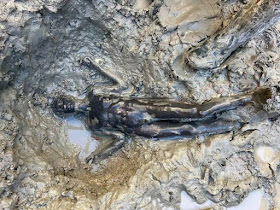In 2010 California's prisons were overcrowded and the state was struggling to comply with a court order to somehow relieve the problem. But now the number of inmates has fallen by more than 70,000, because of the decline in violent crime and some changes in sentencing, and the state is looking to save money by closing unneeded prisons.
Maryland's Supreme Court orders a new trial for a man who was convicted after a ballistics expert testified that bullets found at a crime scene were "definitely" from his gun, which the science does not support; the court will allow only testimony that the bullets are "consistent" with any particular gun.
Two Bronze Age victims of the Bubonic plague identified in Austria, c. 2000 BC.
If you're in Rome, you can now visit the site of the Curia of Pompey, where Julius Caesar was stabbed. (Not in the forum, that's Shakespeare.) Augustus himself called it a locus sceleratus, a cursed place.
A plague of Mormon crickets descends on northern Utah.
Interesting feature on the Natufian site of Nahal Ein Gev II, on the Sea of Galilee, with good photographs. Sadly it has too much verbiage about firsts and beginnings, but such is journalism. (For one thing it is not at all unusual for some members of hunter-gatherer bands to remains in one place all year, and in fact has happened often wherever resources are rich enough.)
Twenty-five years ago a neuroscientist bet a philosopher that within 25 years science would understand how the brain creates consciousness. He lost.
Kevin Drum asks whether it is really harder to live on one income now than in 1960. (No.)
Tyler Cowen wants to understand more explicitly what is really going on in scientific fields, and finds that practitioners are very bad at explaining this.
Beautiful glass by Lino Tagliapietra.
In a review of Patrick Deneen's Regime Change, Ross Douthat asks: if what we need is a different elite, how could we get one? How have elites changed in the past? (NY Times) My answer to that question would be, elites only change in response to profound social and economic change in the whole society. Which means that plans to fix America by replacing our elite are not likely to go anywhere.
A claim that there are 5 billion dormant cell phones in the world, which, if true, says something interesting about capitalism, technological progress, planned obsolescence, waste, and change.
National Geographic lays off all its staff writers; a tweet from the editor says all articles will be freelance.
A house that Henry VIII gave to Anne of Cleves after their annulment is for sale. It has its own wikipedia page, which makes a lot of claims about interesting history.
And now we are told to stop calling it an "attack" when an orca rams a boat, because they might just be trying to play. Still haven't seen anyone call for killing them.
At the Robert F. Kennedy rally, "The people I encountered believe that they are living under a deeply sinister regime that lies to them about almost everything that matters." (NY Times) I think one of our fundamental problems is that the world feels opaque to many, many people, everything happening in ways they don't understand.
538 delves into the polling on affirmative action, which is complicated because small changes in wording can generate shifts in the result, and a question like "Do you support increasing ethnic diversity on college campuses?" can get a different response than "Should colleges be allowed to use race as a factor in admissions?"
Ukraine Links
Russia has doubled the number of pens for the trained dolphins it is using to defend Sevastopol. According to naval experts dolphins are most useful for defending against human frogmen, so it seems Russia is worried about Ukraine's special forces.
Prigozhin's first post-coup statement.
Gary Kasparov on what Prigozhin's coup means about Russia.
And Dmytro Natalukha: "Prigozhin will be liquidated, and Putin will be replaced."
And Tatiana Stanovaya has her own explanation of what happened, clera and concise.
A portrait of Prigozhin as am amoral thug.
After diplomatic meetings, the parties often provide the press with a short summary of what went down; this is called a diplomatic readout. Here is the best diplomatic readout ever:
The conversation between Mr. Lukashenko and Mr. Prigozhin was “very difficult,” said Mr. Gigin. . . . “They immediately blurted out such vulgar things it would make any mother cry. The conversation was hard, and as I was told, masculine.”More mutinous talk from Russian soldiers who say they are being wantonly sacrificed and won't take it any more.
















_05.jpg)
































